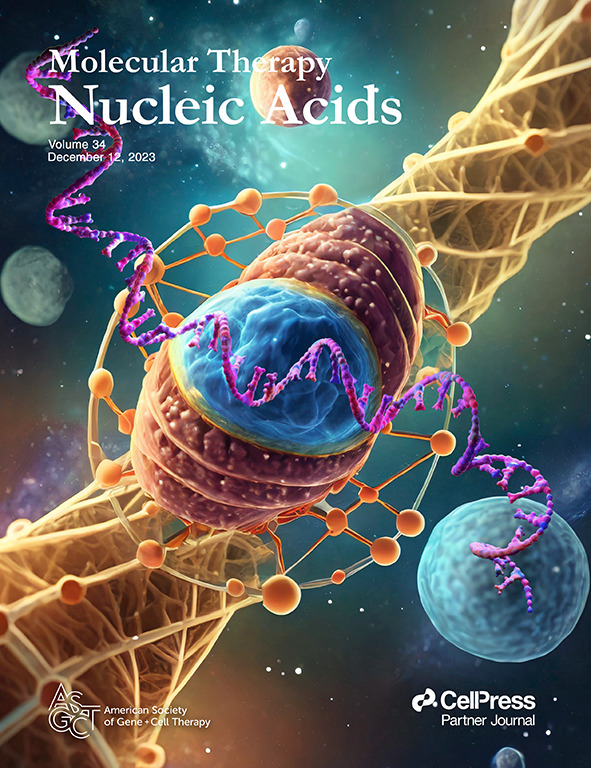Engineered AAV capsid transport mutants overcome transduction deficiencies in the aged CNS
IF 6.5
2区 医学
Q1 MEDICINE, RESEARCH & EXPERIMENTAL
引用次数: 0
Abstract
Adeno-associated virus (AAV)-based gene therapy has enjoyed great successes over the past decade, with Food and Drug Administration-approved therapeutics and a robust clinical pipeline. Nonetheless, barriers to successful translation remain. For example, advanced age is associated with impaired brain transduction, with the diminution of infectivity depending on anatomical region and capsid. Given that CNS gene transfer is often associated with neurodegenerative diseases where age is the chief risk factor, we sought to better understand the causes of this impediment. We assessed two AAV variants hypothesized to overcome factors negatively impacting transduction in the aged brain; specifically, changes in extracellular and cell-surface glycans, and intracellular transport. We evaluated a heparin sulfate proteoglycan null variant with or without mutations enhancing intracellular transport. Vectors were injected into the striatum of young adult or aged rats to address whether improving extracellular diffusion, removing glycan receptor dependence, or improving intracellular transport are important factors in transducing the aged brain. We found that, regardless of the viral capsid, there was a reduction in many of our metrics of transduction in the aged brain. However, the transport mutant was less sensitive to age, suggesting that changes in the cellular transport of AAV capsids are a key factor in age-related transduction deficiency.工程化 AAV 胶囊运输突变体克服了老年中枢神经系统的转导缺陷
过去十年来,基于腺相关病毒(AAV)的基因疗法取得了巨大成功,治疗药物获得了美国食品药品管理局的批准,临床试验项目也十分活跃。然而,成功转化的障碍依然存在。例如,高龄与脑转导受损有关,感染力的减弱取决于解剖区域和囊壳。鉴于中枢神经系统的基因转移通常与神经退行性疾病有关,而年龄是主要的风险因素,我们试图更好地了解这一障碍的原因。我们评估了两种 AAV 变体,假设它们能克服对老年大脑转导产生负面影响的因素,特别是细胞外和细胞表面聚糖的变化以及细胞内转运。我们评估了一种肝素硫酸蛋白聚糖无效变体,该变体是否存在增强细胞内转运的突变。我们将病毒载体注射到年轻成年大鼠或老年大鼠的纹状体中,以探讨改善细胞外扩散、消除聚糖受体依赖性或改善细胞内转运是否是转导老年大脑的重要因素。我们发现,无论病毒壳是什么,老年脑中的许多转导指标都有所下降。然而,转运突变体对年龄的敏感性较低,这表明 AAV 病毒衣壳的细胞转运变化是与年龄相关的转导缺陷的关键因素。
本文章由计算机程序翻译,如有差异,请以英文原文为准。
求助全文
约1分钟内获得全文
求助全文
来源期刊

Molecular Therapy. Nucleic Acids
MEDICINE, RESEARCH & EXPERIMENTAL-
CiteScore
15.40
自引率
1.10%
发文量
336
审稿时长
20 weeks
期刊介绍:
Molecular Therapy Nucleic Acids is an international, open-access journal that publishes high-quality research in nucleic-acid-based therapeutics to treat and correct genetic and acquired diseases. It is the official journal of the American Society of Gene & Cell Therapy and is built upon the success of Molecular Therapy. The journal focuses on gene- and oligonucleotide-based therapies and publishes peer-reviewed research, reviews, and commentaries. Its impact factor for 2022 is 8.8. The subject areas covered include the development of therapeutics based on nucleic acids and their derivatives, vector development for RNA-based therapeutics delivery, utilization of gene-modifying agents like Zn finger nucleases and triplex-forming oligonucleotides, pre-clinical target validation, safety and efficacy studies, and clinical trials.
 求助内容:
求助内容: 应助结果提醒方式:
应助结果提醒方式:


